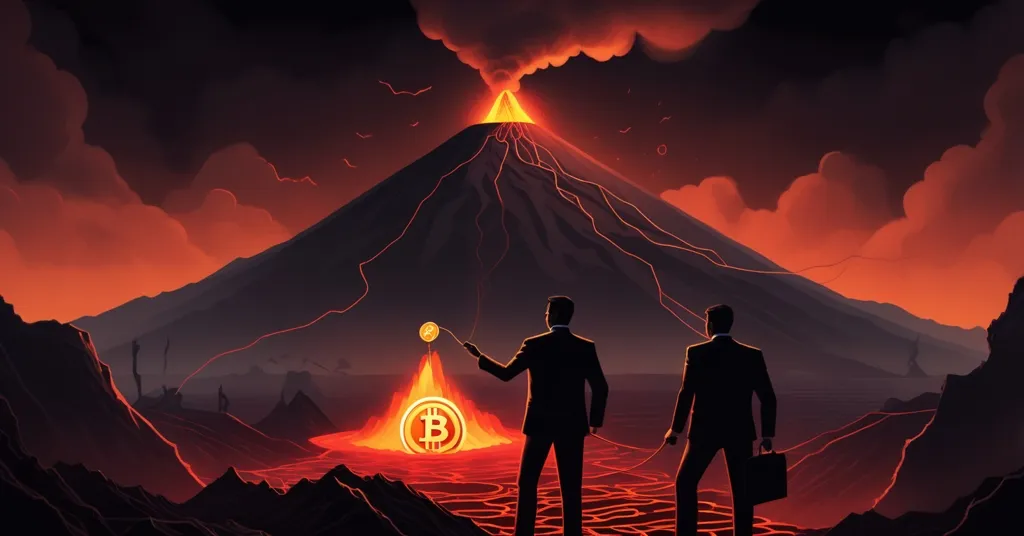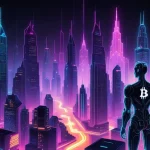El Salvador’s Bitcoin Defiance: IMF Clash or Deceptive Wallet Games?

El Salvador’s Bitcoin Experiment: Defying the IMF or Deceptive Tactics?
El Salvador, the pioneering nation that declared Bitcoin (BTC) as legal tender in 2021 under President Nayib Bukele, finds itself in a contentious spotlight yet again. Clashing with International Monetary Fund (IMF) restrictions tied to a $1.4 billion bailout, the country claims to be stacking more BTC despite explicit conditions to halt purchases. But whispers of wallet shuffling, dismal adoption rates, and murky ties to controversial entities like Bitfinex and Tether paint a far messier picture. Is this defiance a bold stand for financial sovereignty, or a deceptive game of smoke and mirrors?
- IMF Clash: A $1.4 billion bailout demands no new Bitcoin buys, yet Bukele and the National Bitcoin Office (ONBTC) insist they’re still acquiring BTC.
- Adoption Failure: 92% of Salvadorans reject BTC for transactions, with the Chivo wallet riddled with fraud and tech failures.
- Ownership Doubts: Serious questions linger over whether El Salvador truly controls its 6,190 BTC treasury, with heavy links to Bitfinex.
Background: Why Bitcoin in El Salvador?
In September 2021, El Salvador made global headlines as the first country to adopt Bitcoin as legal tender, a move spearheaded by President Nayib Bukele. The vision was ambitious: leverage BTC to boost financial inclusion in a nation where roughly 25% of GDP—about $7 billion annually—comes from remittances sent by a vast diaspora, often at steep fees of 10-20% through traditional channels. With over half the population lacking access to formal banking, Bitcoin was pitched as a way to bypass middlemen, cut costs, and empower the unbanked using just a smartphone. For more on the policy’s origins, check out this detailed overview of Bitcoin’s legal tender status in El Salvador.
Yet, the socioeconomic reality tells a different tale. El Salvador’s economy, with a GDP of around $29 billion, grapples with persistent debt and poverty—over 20% of citizens live below the national poverty line, and average monthly incomes hover near $360. Internet penetration, critical for crypto use, sits at about 60%, per World Bank data, leaving rural areas disconnected. Bukele’s populist appeal thrives on promises of disrupting outdated financial systems, aligning with Bitcoin’s decentralized ethos. But executing this in a country with limited tech literacy and infrastructure was always going to be a long shot.
Adoption Reality Check: Chivo Wallet Woes
Fast forward to 2024, and El Salvador’s Bitcoin dream looks more like a nightmare for most citizens. A survey by San Salvador University found a damning 92% of 1,224 respondents don’t use BTC for transactions, up from 88% in 2023. Only a measly 1.3% believe it’s a path to economic prosperity. Remittances, the supposed killer use case, are equally bleak—BTC transfers via the government-backed Chivo wallet totaled just $28.8 million in the first four months of 2024, less than 1% of the $2.64 billion sent overall. That’s a drop from $32 million in 2023 and $39.4 million in 2022, showing adoption isn’t just stagnant; it’s shrinking. Community discussions highlight ongoing challenges with Bitcoin adoption and IMF restrictions.
Why the rejection? For starters, Bitcoin transaction fees, recently averaging $1.50 after peaking at $3.65, make small purchases—like a $2 street food meal—absurdly impractical. Imagine paying a bank fee nearly as high as your coffee to settle the bill; it’s a non-starter for everyday use in a low-income nation. Then there’s the Chivo wallet itself, rolled out with much hype in 2021 to onboard citizens into the crypto fold. Instead, it became a textbook case of how not to launch a digital payment system. Fraud ran rampant early on, with scammers hijacking identities to claim the $30 BTC signup bonus offered by the state. Infrastructure glitches meant most retailers couldn’t accept BTC outside tourist enclaves like Bitcoin Beach. Real-world tests, such as one by Reason magazine, reported zero successful transactions over a week in the country. Turns out, shoving digital gold on a nation is tougher than selling ice to penguins when the tech just doesn’t work. Insights into why Bitcoin struggles as legal tender shed further light on these systemic issues.
IMF Showdown: Defiance or Deception?
Enter the IMF, the global financial heavyweight that’s been casting a wary eye on El Salvador’s crypto obsession since day one. On May 27, 2024, a Staff-Level Agreement was forged as part of a $1.4 billion Extended Fund Facility, including a $120 million loan. The terms were crystal clear: stop buying Bitcoin and keep the total amount in government wallets unchanged, while cutting public sector ties to the Chivo wallet by the end of July. The IMF spelled out its stance:
“On Bitcoin, efforts will continue to ensure that the total amount of Bitcoin held across all government-owned wallets remains unchanged, consistent with program commitments, while also securing the unwinding of the public sector’s participation in the Chivo wallet by end-July.”
Yet, on the same day, the ONBTC—led by Stacy Herbert—boasted on social media about snapping up more BTC. Bukele himself fired back with characteristic bravado:
“We’re not stopping [BTC buys]. It won’t stop now, and it won’t stop in the future.”
The ONBTC claims El Salvador now holds 6,190.18 BTC, valued at nearly $673 million as of late 2024, with 8 tokens added in a recent week. A direct middle finger to the IMF? Maybe. But crypto sleuths and analysts suggest this “buying” could be a mirage—potentially just moving existing Bitcoin between wallets to mimic fresh purchases without actually spending new funds. For the uninitiated, wallet shuffling means transferring BTC from one account to another, often to create the appearance of activity or ownership without real transactions occurring. If true, it’s a clever dodge of IMF scrutiny while fueling populist hype at home and among global Bitcoin fans. Recent reports explore whether El Salvador is truly defying the IMF with new BTC purchases or playing a different game.
The stakes here aren’t just political theater. El Salvador’s debt-laden economy leans heavily on IMF support. Breaching terms could delay future loan tranches or tank credit ratings, hiking borrowing costs at a time when fiscal stability is fragile. The IMF sees Bitcoin’s wild price swings and associated risks—like money laundering or capital flight—as a direct threat to macroeconomic health. Bukele’s defiance might rally the crypto crowd, but it’s a high-wire act that could send the nation tumbling if the safety net of international aid gets yanked. Updates on the IMF agreement and Bitcoin purchase conditions provide additional context on this ongoing conflict.
Treasury Mystery: Who Really Owns the BTC?
Dig deeper, and the plot thickens into a murky stew of questionable dealings. Salvadoran journalist Moisés Alvarado dropped a bombshell, revealing that 80% of the country’s reported 6,114 BTC—as of an earlier count—traces back to wallets controlled by Bitfinex, a crypto exchange with a notorious rap sheet. There’s no concrete evidence the state paid for or legally owns these tokens. Another 20% reportedly flowed through Chivo or Binance, but transparency is virtually nonexistent. So, does El Salvador’s much-touted Bitcoin treasury even belong to El Salvador? Investigations into El Salvador’s Bitcoin holdings and Bitfinex connections raise serious doubts about ownership.
Bitfinex and its sister company Tether, the issuer of the USDT stablecoin pegged to the dollar, share key leaders like Paolo Ardoino and Giancarlo Devasini. Both have suspiciously tight ties to Bukele’s administration—think Salvadoran citizenship, local property investments, and even Tether relocating its headquarters to the country. Bitfinex has shaped digital asset laws there, while planning mining operations through Volcano Energy. If this smells like a conflict of interest, that’s because it probably is. These aren’t exactly paragons of virtue—Bitfinex weathered a major hack in 2016 and legal battles over financial opacity, while Tether settled for $18.5 million with the New York Attorney General in 2021 over unverified reserve claims. For a nation already dogged by governance concerns, cozying up to such players raises red flags about who’s really calling the shots. Further details on the conflict between the IMF and El Salvador over Bitcoin highlight the international stakes involved.
More troubling is what this implies for Bitcoin’s decentralized ethos, something we champion fiercely. If El Salvador’s BTC stash is effectively custodied or influenced by corporate entities with sketchy pasts, this isn’t financial sovereignty—it’s a new form of centralization dressed in crypto clothing. The lack of clarity on ownership isn’t just a technicality; it’s a potential scandal waiting to erupt, especially under the IMF’s watchful gaze.
Volcanic Mining: Hot Air or Hot Power?
Then there’s the much-ballyhooed narrative of Bitcoin mining powered by El Salvador’s volcanoes. The ONBTC touts that 473.5 BTC have been mined since 2021 using geothermal energy—clean, renewable power drawn from the country’s volcanic landscape, which accounts for about 25% of its energy mix. It’s a sexy story: sustainable crypto mining in a world increasingly hungry for green solutions. But hold the applause. Alvarado’s investigation suggests this figure ties to global mining pool activity, not rigs humming at the base of El Salvador’s volcanoes. For clarity, mining pools are shared networks where miners worldwide combine computing power to solve Bitcoin’s complex puzzles, splitting rewards. Claiming global pool stats as local output is, at best, misleading. A closer look at Volcano Energy’s geothermal mining claims reveals the gap between promise and reality.
An unnamed crypto-asset expert cut to the chase:
“No headline telling you it’s mining activity in El Salvador, but the government hasn’t refuted this confusion. It seems like some kind of propaganda operation.”
Volcano Energy, chaired by BTC maximalist Max Keiser and backed by Tether investment, promises big—241 MW of capacity scaling to a ludicrous 20,000 MW, with wild forecasts of El Salvador becoming debt-free by 2030 if Bitcoin hits $1 million. Yet, as of late 2024, there’s scant evidence of significant operational output. Compare this to Iceland, where hydropower fuels major Bitcoin mining with proven scalability, and El Salvador’s “volcanic” claims look more like hot air than hot power. Sure, the geothermal potential is real, and if harnessed, could slash energy costs for mining and even citizens. But right now, it’s more sizzle than steak—a shiny PR distraction from the mess on the ground.
Big Picture: Revolution or Reckless Stunt?
So, where does El Salvador’s grand Bitcoin experiment stand? Bukele’s vision of financial freedom through decentralization strikes a chord with those of us rooting for disruption of the status quo. As a nation defying the IMF’s iron grip, there’s something admirable in the sheer audacity—painting El Salvador as a David against the Goliath of traditional finance. If Bitcoin’s price skyrockets, that $673 million treasury could turn into a goldmine, potentially offsetting debt and proving naysayers wrong. And let’s play devil’s advocate: what if this gamble sparks wider Latin American adoption, forcing global institutions like the IMF to rethink their hostility toward crypto? Could Bukele be planting seeds for a broader financial revolution?
But let’s not get lost in the hype. The reality is brutal—adoption is near-dead, the Chivo wallet is a laughingstock, and the BTC treasury’s ownership is a giant question mark. Economic risks loom large; alienating the IMF over speculative gains could choke off vital aid for a country already on shaky fiscal ground. Volatility remains Bitcoin’s Achilles’ heel—one major crash could wipe out treasury value overnight. And those Bitfinex-Tether ties? They hint at a shadow game that undercuts the very principles of transparency and sovereignty Bitcoin stands for. This isn’t just a bold bet; it’s a reckless stunt teetering on the edge of disaster, wrapped in slick propaganda.
Key Questions and Takeaways on El Salvador’s Bitcoin Saga
- Is El Salvador still buying Bitcoin despite IMF rules?
The IMF’s $1.4 billion bailout demands no new BTC purchases, yet Bukele and ONBTC claim they’re still stacking, possibly via wallet shuffling to sidestep scrutiny without real buys. - Why has Bitcoin failed as legal tender in El Salvador?
High transaction fees, fraud in the Chivo wallet, tech failures, and low trust or literacy mean 92% of Salvadorans skip BTC, with crypto remittances under 1% of the total. - Does El Salvador truly control its Bitcoin treasury?
Journalist Moisés Alvarado reports 80% of the 6,190 BTC traces to Bitfinex-controlled wallets with no proof of state ownership, suggesting the treasury might not be fully state-owned. - Are El Salvador’s geothermal Bitcoin mining claims credible?
ONBTC’s claim of mining 473.5 BTC likely reflects global pool data, not local output, pointing to potential propaganda as Volcano Energy shows no significant results yet. - What risks come with El Salvador’s ties to Bitfinex and Tether?
Given their regulatory baggage and deep policy influence, these ties risk governance conflicts, international backlash, and undermining decentralization under IMF oversight.
El Salvador’s Bitcoin journey embodies the wild promise and jagged pitfalls of crypto adoption at a national scale. Bukele’s push for financial sovereignty through decentralization is a noble middle finger to outdated systems, and as advocates of breaking the mold, we can’t help but cheer for the underdog. But let’s not fall for the hype blindfolded—transparency is non-negotiable, and right now, the numbers, ownership, and execution are a mess. This isn’t just about stacking sats; it’s about whether a nation can wager its future on digital gold without getting scorched. Will this bet ignite a financial uprising, or collapse into a pit of debt and distrust? Only time—and a serious dose of clarity—will tell.



